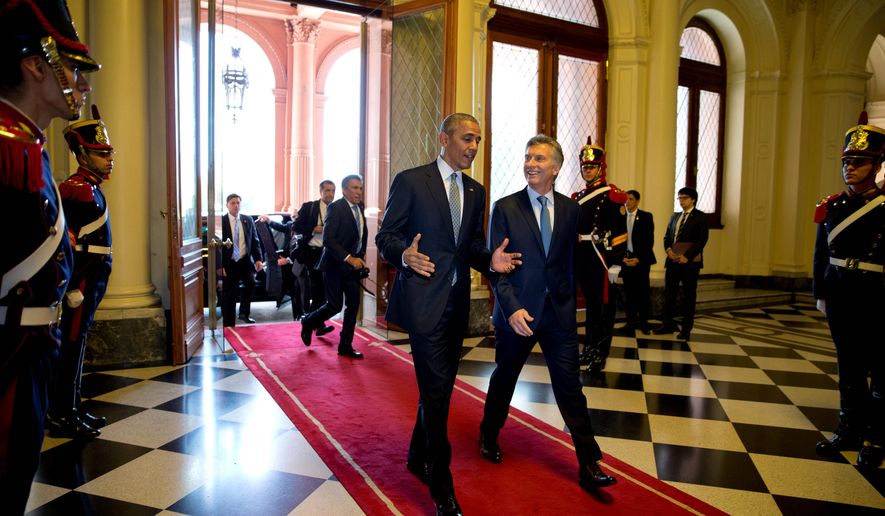Hoping to build trust with Argentina’s new center-right government, President Obama pledged Wednesday to declassify secret military and intelligence files on the U.S. role in the coup that installed a brutal military regime in Buenos Aires 40 years ago.
“We are absolutely determined to do our part as Argentina continues to heal and move forward as one nation, and I hope this gesture also helps to rebuild trust that may have been lost between our two countries,” Mr. Obama said at a joint press conference with Argentine President Mauricio Macri, who said his country was “thankful for this gesture.”
“We all need and we are entitled to know what the truth is,” said Mr. Macri, a former businessman who is trying to rebuild relations with the U.S. and global financial markets after more than a dozen years of populist, leftist rule.
Mr. Obama’s first-ever visit to Argentina coincides with the country’s 40th anniversary on Thursday of the military coup, which Mr. Macri described as “the darkest chapter in our history.” The top human rights groups in Argentina are boycotting and protesting Mr. Obama’s presence during the anniversary, describing the timing of the trip as a “provocation.”
The U.S. previously had released files pertaining to Argentina’s so-called “dirty war,” but the Obama administration is committing to declassifying thousands more records from the CIA, FBI and Defense Department. An estimated 30,000 people were killed during the military junta’s rule, which began in 1976 and lasted until 1983.
Many Argentines blame the U.S. for encouraging the coup and supporting the junta. Thousands of the victims, known as “the disappeared,” have never been found, while others were illegally detained and tortured.
SEE ALSO: Hillary Clinton emails: State Dept. still lacks staffers to process court requests
Gen. Jorge Rafael Videla, who led the coup, died in jail in 2013 while serving a sentence for human rights violations.
Mr. Obama chose his words carefully when asked by an Argentine journalist if he felt the U.S. was responsible for the “dirty war.”
He said U.S. foreign policy had learned from the mistakes of the past, including its involvement in the Argentina coup.
“I don’t want to go through the list of every activity of the United States in Latin America over the last 100 years,” Mr. Obama said, adding that U.S. administrations of both parties gradually emphasized human rights in foreign policy as equally important to fighting communism.
“I think our experiences with a country like Argentina helped us to develop that more mature, and ultimately I think, more successful approach to foreign policy,” he said.
Mr. Macri, who came to power in December, said the visit marked the start of “new, mature and intelligent relations” between the two countries. His predecessor, leftist Cristina Fernandez de Kirchner, was plagued by corruption scandals and antagonized the Obama administration by accusing the U.S. of smuggling guns and drugs into the country.
SEE ALSO: Obama: Republicans think I want to turn U.S. into Cuba
Mr. Obama called Mr. Macri “a man in a hurry.”
“I’m impressed because he has moved rapidly on some many reforms to reconnect Argentina with the world community,” he said.
“Argentina needs to be a critical partner with us. It is one of the biggest, most important countries in the region.”
Earlier this month, Argentina signed an agreement with U.S. hedge funds to settle a 15-year dispute over its failure to repay billions of dollars worth of bonds. Ms. Fernandez had refused to negotiate with the investors, calling them “vulture funds.”
Mr. Macri also lifted capital and trade controls, slashed bloated power subsidies and cut a debt deal with “hold-out” creditors in the U.S. But he still has to grapple with double-digit inflation, a yawning fiscal deficit and a shortage of hard currency, and has made securing new foreign investment flows a priority.
Mr. Obama said the two governments would work to identify barriers impeding greater trade flows between the two economies, but said a free trade agreement was something that might lie at the end of the process.
“Right now there’s a lot of underbrush, a lot of unnecessary trade irritants and commercial irritants that can be cleared away administratively, and that’s some of the work that we intend to do right away,” Mr. Obama said.
The two presidents also discussed briefly the economic and political crisis in neighboring Brazil, Argentina’s biggest commercial partner, where President Dilma Rousseff is facing a corruption scandal and calls for her impeachment.
“We need a strong and effective Brazil for our own economies and world peace,” Mr. Obama said, expressing confidence Brazil’s political and legal systems were “mature” enough to manage the crisis.
Mr. Obama also participated in a town hall meeting with young Argentines, and was feted with first lady Michelle Obama at a state dinner Wednesday night.
Before returning to Washington, Mr. Obama is scheduled to spend part of Thursday with his wife and daughters on a leisurely day trip to Bariloche, a picturesque city in southern Argentina.
• This article is based in part on wire service reports.
• Dave Boyer can be reached at dboyer@washingtontimes.com.




Please read our comment policy before commenting.